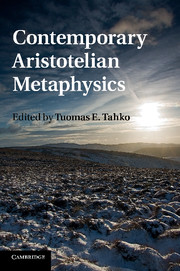Book contents
- Frontmatter
- Contents
- Contributors
- Preface
- Introduction
- Chapter 1 What is metaphysics?
- Chapter 2 In defence of Aristotelian metaphysics
- Chapter 3 Existence and quantification reconsidered
- Chapter 4 Identity, quantification, and number
- Chapter 5 Ontological categories
- Chapter 6 Are any kinds ontologically fundamental?
- Chapter 7 Are four categories two too many?
- Chapter 8 Four categories – and more
- Chapter 9 Neo-Aristotelianism and substance
- Chapter 10 Developmental potential
- Chapter 11 The origin of life and the definition of life
- Chapter 12 Essence, necessity, and explanation
- Chapter 13 No potency without actuality: the case of graph theory
- Chapter 14 A neo-Aristotelian substance ontology: neither relational nor constituent
- References
- Index
Chapter 12 - Essence, necessity, and explanation
Published online by Cambridge University Press: 05 December 2011
- Frontmatter
- Contents
- Contributors
- Preface
- Introduction
- Chapter 1 What is metaphysics?
- Chapter 2 In defence of Aristotelian metaphysics
- Chapter 3 Existence and quantification reconsidered
- Chapter 4 Identity, quantification, and number
- Chapter 5 Ontological categories
- Chapter 6 Are any kinds ontologically fundamental?
- Chapter 7 Are four categories two too many?
- Chapter 8 Four categories – and more
- Chapter 9 Neo-Aristotelianism and substance
- Chapter 10 Developmental potential
- Chapter 11 The origin of life and the definition of life
- Chapter 12 Essence, necessity, and explanation
- Chapter 13 No potency without actuality: the case of graph theory
- Chapter 14 A neo-Aristotelian substance ontology: neither relational nor constituent
- References
- Index
Summary
Introductory remarks
It is perhaps still quite common among contemporary metaphysicians to think of essence along modal lines: an essential truth, on this conception, is just a modal truth of a certain kind (viz., one that is both necessary and de re, i.e., about a certain object); and an essential property is just a feature an object has necessarily, if it is to exist. The essential truths, according to this approach, are thus a subset of the necessary truths; and the essential properties of objects are included among its necessary properties. Quine for example has such a modal conception of essence in mind, when he argues that the view he calls ‘Aristotelian essentialism’ is incoherent, because it requires quantification into intensional contexts (cf. Quine 1953).
But the view Quine calls ‘Aristotelian essentialism’ is for a variety of reasons not one Aristotle himself would have found congenial. One important respect, which will concern us here, in which Aristotle would have wanted to distance himself from what Quine calls ‘Aristotelian essentialism’ is that Aristotle does not subscribe to a modal conception of essence. For Aristotle, the essential truths are not even included among the necessary truths; and the essential features of an object are similarly not included among its necessary features. Rather, Aristotle conceives of the necessary truths as being distinct and derivative from the essential truths; and he conceives of the necessary features of objects, traditionally known as the ‘propria’ or ‘necessary accidents’, as being distinct and derivative from, the essential features of objects. Such a non-modal conception of essence also constitutes a central component of the neo-Aristotelian approach to metaphysics defended over the last several decades by Kit Fine (see for example Fine 1994, 1995a, 1995b, 1995c). Like Aristotle, Fine holds that we should not try to reduce essence to modality; rather, the modal status of necessary truths, in Fine’s view, is grounded in, and hence derivative from, facts about essences.
Information
- Type
- Chapter
- Information
- Contemporary Aristotelian Metaphysics , pp. 187 - 206Publisher: Cambridge University PressPrint publication year: 2011
Accessibility standard: Unknown
Why this information is here
This section outlines the accessibility features of this content - including support for screen readers, full keyboard navigation and high-contrast display options. This may not be relevant for you.Accessibility Information
- 10
- Cited by
